Secure your future job with a tutor resume that speaks volumes about your skills and experience!
As a tutor, you help students learn outside their classroom environment, focusing on improving their academic performance. You make sure that you spur motivation in your students who then grasp concepts that were once difficult for them more easily. If you want to learn how to translate all that into your resume, follow our guide and discover the best writing tips, resume samples, customizable templates, and plenty of detailed examples.
Keep reading and learn how to:
- Give your tutor resume the right format
- Write an eye-catching tutor professional profile
- Include the best tutoring skills in your resume
- Include your best achievements in your tutor work experience section
- Make your tutor education section stand out
- Access top resources for job-seeking tutors
Still looking for a job? These 100+ resources will tell you everything you need to get hired fast.
1. Give your tutor resume the right format
If you want to hook your prospective clients from the very beginning, you’ll need to make sure your resume format is impeccable.
Not only should you care for flawless grammar (which is surely a superpower of any tutor), but you ought to show your ability to organize your text clearly and effectively:
- Select a two-column layout, that will allow you to aptly include numerous resume sections without exceeding 2 pages.
- Separate your resume sections through clever use of white space and bigger headings.
- List your tutoring work experience, education, courses or certifications in a reverse-chronological order.
- Use bulleted lists when providing details, avoiding large chunks of text that would clutter your CV.
- Employ a clear typeface such as Cambria or Arial.
Choose your preferred template and make your resume shine.
2. Write an eye-catching tutor professional profile
You certainly have a lot on your plate when delivering classes. You prepare your students for a variety of exams, assist them with their homework, teach them how to properly take notes, and many other activities that will enhance their learning process.
The good news is that you don’t have to mention them all in your professional profile. It has, however, its challenging side, which is having to select the most relevant information that will do the job and impress your future client in a trice.
The following tips will help you craft an effective blurb, presenting your tutoring experience and skills in the best light:
- Refer to the job posting in question and use the keywords from it. If your prospective client is looking for a tutor with modern teaching approaches to deliver engaging literature lessons, you may want to seamlessly incorporate expressions such as modern approach and engaging literature class in your profile.
- Describe your relevant skills and accomplishments employing powerful adjectives. Fair examples might be: dedicated, passionate, excellent, engaging, etc.
- Make your professional profile brief and to the point.
Tutor professional profile example
Dedicated and passionate English Literature Tutor offering excellent communication skills and a modern approach to learning. With 3+ years of experience in delivering engaging English Literature and Composition classes. Effective team player with the important ability to think critically and solve complex problems.
3. Include the best tutoring skills in your resume
Your ultimate goal is to prove that you can enhance your client’s academic or non-academic learning experience. And what is a better way than providing them with your hard and soft skill-sets.
Keep in mind that you should first mention those skills of yours that match the job ad you are interested in. Let’s take a look at some transferable and non-transferable skills you can use for your tutor CV.
Effective soft skills to put on your tutor resume
- Active listening
- Effective Communication
- Leadership
- Problem-solving
- Time management
- Patience
- Positivity
- Empathy
- Confidentiality
The best hard skills for your tutor CV
- Effective pedagogy
- Learning strategies
- Designing teaching plans
- Word processing
- Spreadsheets skills
- Database skills
- Electronic presentation skills
4. Include your best achievements in your tutor work experience section
When presenting your work history, always start with the most recent tutoring position you held. State the name of the institution or client, your position, and years spent performing the role.
Keep in mind that each client may have a bunch of resumes to go through, and they’re certainly looking for someone special. Someone who not only can perform every-day, regular duties of a tutor but, most importantly, has one or two quantifiable accomplishments on their scoreboard.
Tutor work experience section example
Platinum Edge Tutoring
English Literature and Composition Tutor
2018-2019
- Gave engaging in-person instruction to 20 English Literature students to help them improve their academic results.
- Successfully prepared students for weekly exams.
- Designed interactive lesson plans with attainable learning objectives.
- Kept records of student performance and addressed areas of opportunity.
- Improved student exam score by 23% within 2 months.
5. Make your tutor education section stand out
Believe it or not, you can actually get ahead of other candidates by spicing up your education section. The only thing you’ll need is a handful of academic achievements or areas of interest related to the subject you teach.
If you are, for instance, a literature tutor, your prospective clients will unquestionably appreciate that your literary analysis essay on Twelfth Night was awarded the first prize in an essay-writing competition.
Tutor education section example
New York University, New York, NY, USA
B.S. in Teaching English
09/2019-2022
- Area of interest: Anglo-American Literature
- Won 1st prize in a school essay-writing competition: Gender Ambiguity in Twelfth Night
6. Valuable job search resources for tutors
If you've made it this far, you're now more than well-equipped to make your tutor resume stand leagues above the competition. All that's left to do is start looking for job opportunities that speak to you. To help you with our job hunt, we've assembled the following list of resources:
- Job boards for tutors: The best way to kick off our job search is by checking websites that connect tutors with potential students, like Wyzant, Tutor.com, or Varsity Tutors.
- Tutoring abroad: If you're interested in teaching internationally, platforms like Preply, Teach Away, and Tutor Hunt list opportunities for both online and in-person tutoring.
- General job search platforms: Although broad in focus, websites like Glassdoor, Indeed, Monster, and SimplyHired can also yield compelling results.
- Networking: If you prefer making connections less formally, take advantage of the vast services provided by LinkedIn.
- Professional associations: Organizations like National Tutoring Association (NTA), Tutors' Association (UK), and Tutors International offer support for tutors worldwide by providing them access to training programs, networking events, and specialized publications.
- Courses & certifications: To keep your tutoring skills sharp and up-to-date, consider looking at online learning platforms that offer a wide selection of courses and certifications, such as Coursera, edX, or Udemy
Rest assured, your ideal job is out there, waiting for you to teach it a lesson, or two.
Tutor Resume FAQ
How can I effectively showcase my tutoring skills on my resume?
List your tutoring skills in a dedicated “Skills section,” and also weave them into your job descriptions (in your “Work experience section”). Include both hard skills (like proficiency in specific subjects or technologies) and soft skills (such as communication, patience, and adaptability). You want to show not only that you have skills, but also that you can utilize them and achieve tangible results. You can do that by adding quantifiable data to your achievements whenever possible (e.g., number of students tutored, improvement metrics).
What are the common mistakes to avoid when writing a tutor resume?
Some of the most common mistakes include: Not tailoring your resume to align with the job requirements, NOT quantifying your achievements, typos and grammatical errors. You also want to avoid unnecessary information and fluff words. The majority of these issues can be fixed by thorough proofreading.
How important are keywords in a tutor resume and how do I use them effectively?
Keywords are crucial when submitting your application via the Applicant Tracking Systems (ATS). First, you need to review job postings to identify frequently mentioned requirements and skills (also years of experience, degrees, certifications, …). Then, incorporate these terms naturally throughout your resume. Keywords might also include specific subjects you’ve taught, educational software you’re proficient in, or methodologies you utilize.
What should I highlight if I’m new to tutoring?
In this case, you can highlight your educational background, particularly in relevant subjects. Also, include any internships, volunteer work, or situations where you have helped others learn, even informally. Also, emphasize soft skills like communication, patience, and enthusiasm for teaching. If you've experience with other professions, you can focus on any transferable skills you've gained that might be relevant for a tutoring position.
How can I effectively convey my ability to adapt my tutoring methods to different learning styles?
The best way to communicate your adaptability is to show it in action. Provide specific examples in your job descriptions. For example, mention how you've developed and implemented customized lesson plans that cater to visual, auditory, kinesthetic, or reading/writing learners. If possible, you can also highlight any training or professional development courses you’ve taken on differentiated instruction or educational psychology.

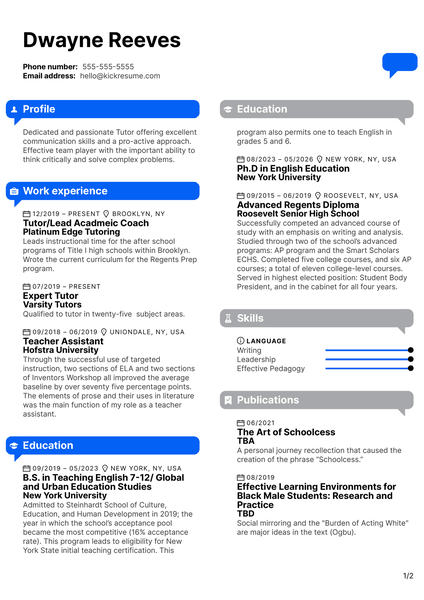
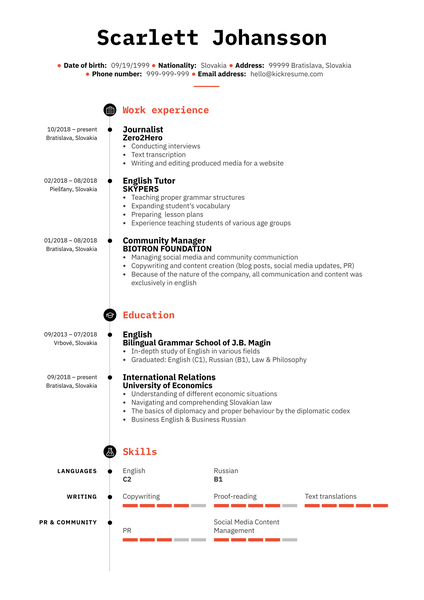


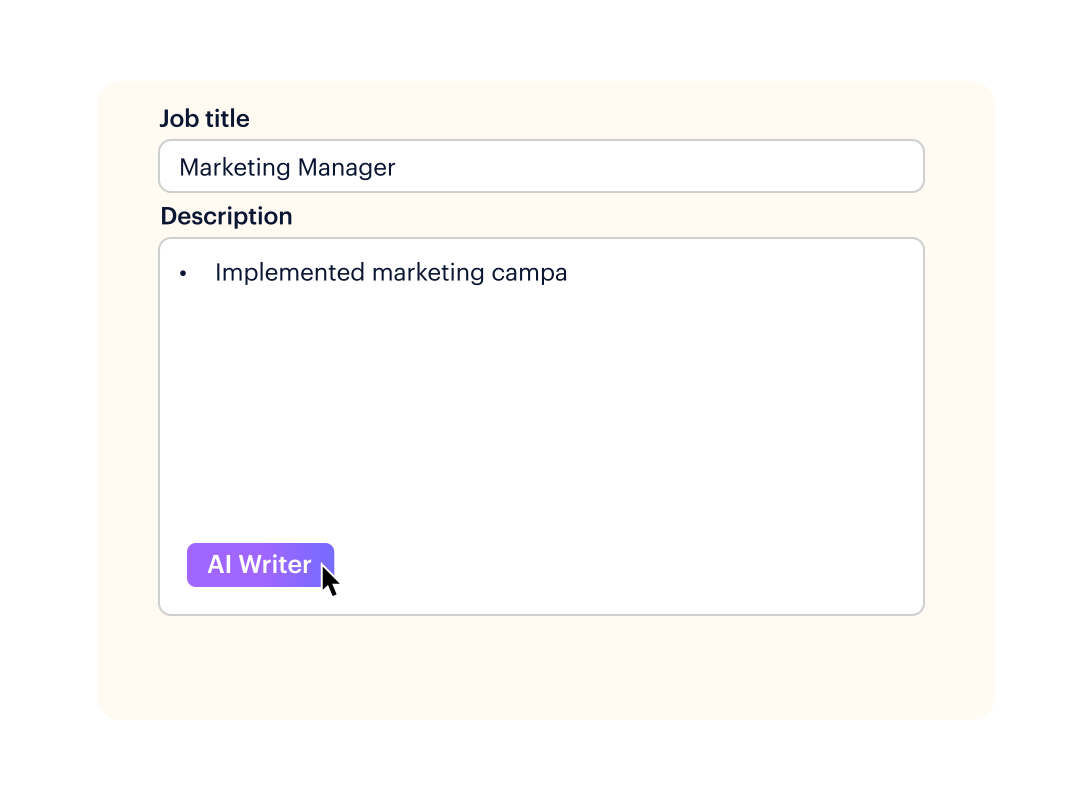

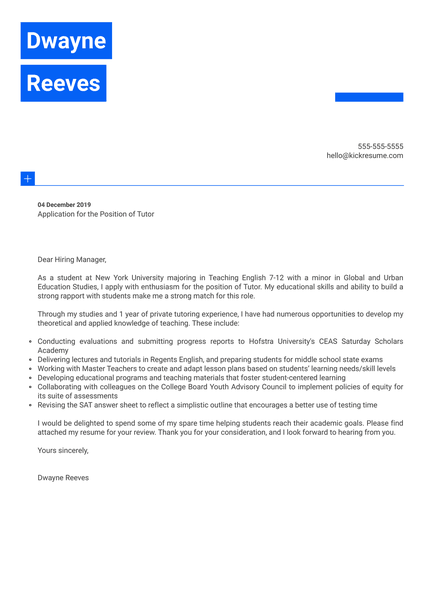
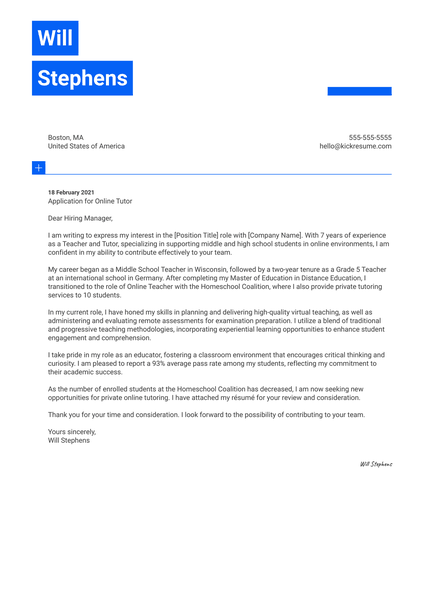
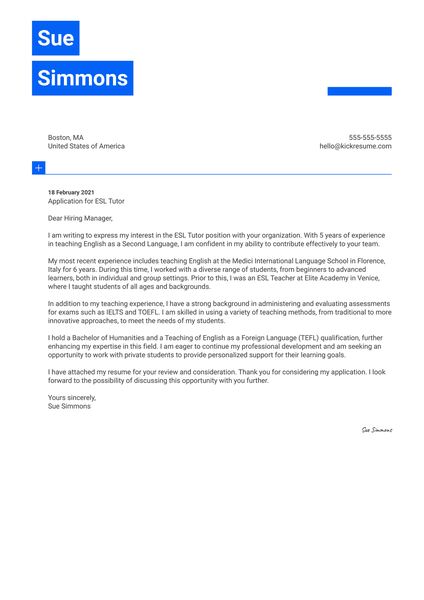
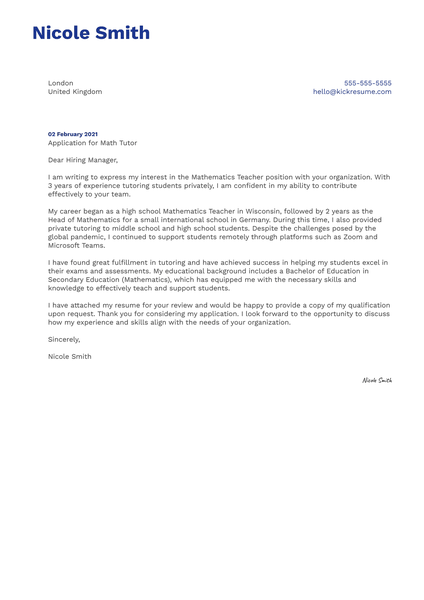

![How to Write a Professional Resume Summary? [+Examples]](https://d2xe0iugdha6pz.cloudfront.net/article-small-images/i-Profile.svg)
![How to Put Your Education on a Resume? [+Examples]](https://d2xe0iugdha6pz.cloudfront.net/article-small-images/i-Collage-Universities.svg)
![How to Describe Your Work Experience on a Resume? [+Examples]](https://d2xe0iugdha6pz.cloudfront.net/article-small-images/Experience.svg)


